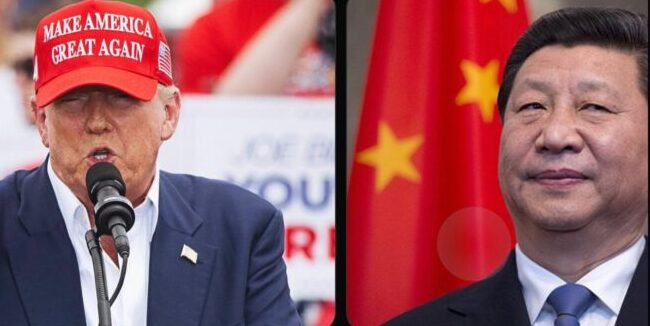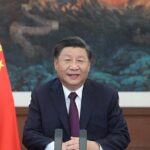US President-elect Trump says he’s been talking with Chinese President Xi Jinping and is confident he will get along “very well” with him
US President-elect Trump Confident in Strong Relationship with Chinese President Xi Jinping
In a statement that has garnered widespread attention, US President-elect Donald Trump recently revealed that he has been in discussions with Chinese President Xi Jinping and expressed confidence that they will develop a strong and productive relationship. The statement has reignited interest in the future of US-China relations, particularly in the context of Trump’s upcoming presidency. As two of the world’s most influential political and economic leaders, their dynamic could shape global affairs for years to come.
A Promising Start: Trump’s Confidence in Xi Jinping
President-elect Trump’s remarks come as part of a broader discussion about his approach to international diplomacy, especially concerning relations with China. The incoming US president has made headlines for his unconventional approach to foreign policy, often emphasizing a more transactional, business-oriented perspective. Trump’s remarks about his confidence in getting along with President Xi reflect his belief that personal rapport will play a key role in managing the complex relationship between the US and China.
Trump noted that he had engaged in multiple conversations with Xi Jinping, indicating a desire to establish a cooperative tone right from the start. The relationship between these two leaders is poised to have a significant impact on a wide range of global issues, from trade and security to climate change and international diplomacy. While their backgrounds, ideologies, and leadership styles differ significantly, Trump’s confidence suggests a more pragmatic and diplomatic approach to the longstanding challenges between the two nations.
The Importance of US-China Relations
The US and China share one of the most consequential bilateral relationships in the world. As the two largest economies, their interactions have a profound effect on global markets, international trade, and even political stability. However, the relationship has not been without its tensions. Trade imbalances, intellectual property concerns, and geopolitical issues such as the South China Sea dispute have caused friction in the past.
Under President Xi Jinping’s leadership, China has increasingly asserted its influence on the global stage, while Trump has often criticized China’s trade practices, labeling them as unfair. The trade war that escalated during Trump’s first term, marked by tariffs and retaliatory measures, highlighted the deep-rooted tensions between the two superpowers. Despite these challenges, both countries have also demonstrated moments of cooperation, especially in areas like climate change and global health.
With Trump’s remarks signaling a willingness to engage positively with President Xi, there’s hope that the new administration could foster a constructive dialogue. Understanding each other’s priorities and working together on shared interests could pave the way for stabilizing the relationship.
Key Areas for Cooperation Between the US and China
As Trump and Xi Jinping look to build a strong working relationship, several critical areas stand out where collaboration between the US and China could yield mutual benefits. Here are some key sectors where cooperation could help defuse tensions and promote peace and prosperity:
- Trade and Economic Cooperation
Trade between the US and China is worth trillions of dollars, making it one of the most important aspects of their bilateral relationship. During Trump’s first term, the trade war disrupted this flow, but with his new focus on engagement with Xi, there is potential for resolving trade disputes. Reaching an agreement on issues such as tariffs, market access, and intellectual property rights could restore stability to the global economy. - Climate Change and Environmental Protection
China has emerged as a major player in addressing global climate change, investing heavily in renewable energy and sustainable practices. As the US reenters the Paris Agreement under the Biden administration, Trump and Xi’s collaboration on climate issues could make a significant impact on international efforts to combat global warming. Joint initiatives in green technologies and clean energy could not only benefit both nations but also set a global example. - Global Health and Pandemic Preparedness
The COVID-19 pandemic has highlighted the importance of international collaboration in addressing global health crises. The US and China both play central roles in the global health system, with their healthcare infrastructure, research capabilities, and manufacturing capacity. Working together on pandemic preparedness, vaccine distribution, and public health initiatives could lead to breakthroughs in combating future health challenges. - Geopolitical Stability and Security
While there are several areas of disagreement between the US and China on geopolitical issues, particularly in regions such as the South China Sea, both countries have a vested interest in maintaining global stability. By establishing clearer communication and working together on international security concerns, they could contribute to peace in areas of shared interest. Cooperation on counterterrorism, nuclear non-proliferation, and regional conflicts could strengthen both nations’ influence in maintaining a secure world order. - Technology and Innovation
Both the US and China are leaders in technological innovation, with a strong focus on fields such as artificial intelligence, 5G technology, and space exploration. By fostering a collaborative relationship in these high-tech sectors, the two nations could enhance global progress. However, there are challenges in terms of competition, especially in the tech industry. While it is likely that competition will remain, areas of collaboration, such as joint ventures in space exploration or technology standards, are possible avenues for cooperation.
Challenges in Building Strong Ties
Despite the optimism expressed by President-elect Trump, there are several challenges that could complicate efforts to build a lasting and fruitful relationship with President Xi Jinping. Some of these challenges include:
- Differing Political Systems
The US and China operate under different political systems—democracy versus one-party rule. This fundamental difference can create friction, particularly in areas such as human rights and governance. Trump and Xi will need to navigate these differences to find common ground on issues that transcend political ideologies. - Regional Tensions and Security Concerns
Issues such as Taiwan, Hong Kong, and the South China Sea remain sensitive topics in US-China relations. Trump’s stance on these matters, as well as Xi’s position on China’s territorial ambitions, will likely affect their interactions. Maintaining peace and avoiding escalation in these regions will require careful diplomacy. - Economic and Trade Imbalances
One of the key issues in the US-China relationship has been the trade deficit and imbalances. While both leaders may want to improve trade relations, finding a way to address these imbalances in a mutually beneficial manner will require significant negotiation and compromise.
Looking Forward: A New Era of US-China Relations?
President-elect Trump’s optimism about his potential relationship with President Xi Jinping sets the stage for a new chapter in US-China relations. Despite the challenges and differences that may arise, both countries share common interests that could guide their interactions toward mutual benefit. If the two leaders can effectively navigate the complexities of their relationship and work together on global issues, their cooperation could have a far-reaching impact on international diplomacy, trade, and security.
In the coming years, the world will be watching closely to see how Trump and Xi manage their relationship. Their ability to engage in constructive dialogue and find common ground could pave the way for a more stable and prosperous future, not just for the US and China, but for the entire world.
In Conclusion
As President-elect Trump prepares to take office, his remarks about working closely with Chinese President Xi Jinping mark a potential turning point in US-China relations. While challenges are inevitable, there is hope that with mutual respect and strategic engagement, both nations can overcome their differences and collaborate on critical global issues. The future of US-China relations remains a critical factor in shaping the course of global politics, and the coming years will reveal whether this new approach leads to lasting and meaningful cooperation.

















Post Comment